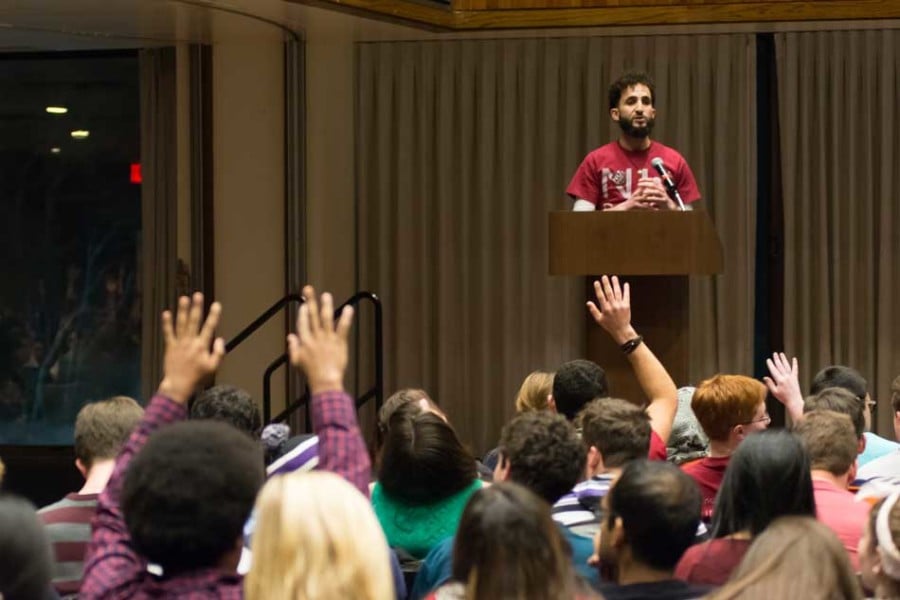NUDivest continues push for investment reform, dialogue
Daily file photo by Nathan Richards
Students raise their hands in “silent applause” as an NUDivest member speaks in favor of the collective’s resolution at The Senate’s Feb. 18 meeting. The body would go on to pass the resolution at the end of the meeting.
September 23, 2015
Up to Date
Catch up on the biggest ongoing news stories affecting Northwestern and Evanston with The Daily’s new explainer series: Up to Date.
Omar Shanti framed the article and put it up on his bookshelf.
“ASG narrowly passes NUDivest resolution,” the headline reads, accompanied by a photo of cheering supporters.
But no policy changed when the votes were counted, and no money was divested when the gavel sounded.
As it enters its second year on campus, Northwestern Divest hopes to codify the demands made in its resolution: that the University pursue socially responsible investment, and that it divest from six corporations the group says violate Palestinian human rights. But administrators haven’t shown much support for the group’s ideas, and no investment policy has changed since the group formed during Winter Quarter 2015.
Shanti, a McCormick junior who is a member of NUDivest, said members have met with administrators to discuss the collective’s goals, but progress is slow.
Shanti alluded to the University’s tepid responses to past divestment movements, specifically those targeting South Africa and Sudan. In the case of South Africa, student activists lobbied the University for two years before it divested $3.5 million from two companies with ties to the country in 1986.
That wasn’t quite a victory, though: The University still had more than $160 million invested in companies involved in South Africa as of that year.
NUDivest faces similar obstacles. Speaking to The Daily in May, University President Morton Schapiro showed no support for NUDivest, nor any intention to comply with its resolution.
“The students of Northwestern, the elected representatives did a vote that I might not agree with — don’t agree with,” he told The Daily.
Still, the collective might find progress elsewhere. William McLean, the University’s chief investment officer, has expressed some openness to a socially-responsible investment committee, one of NUDivest’s recommendations.
“There’s an argument for having a central place where some of these (investment issues) get vetted,” McLean said in April. “We’re interested in hearing student voices, and maybe a committee is a better way to do it.”
In the meantime, Shanti said, NUDivest will continue to promote dialogue among students.
“We’re still looking to provoke meaningful conversations about the systematic suffocation of the Palestinian people,” Shanti said.
In February, Senate debated the resolution for more than five hours during a heated, emotional meeting that featured dozens of students from both NUDivest and NU Coalition for Peace — a group largely comprising Jewish students who opposed the resolution — alternating pro and con speeches. Senate eventually passed the resolution by two votes: 24 for, 22 against and three abstentions.
Students on both sides sometimes deviated from discussing the resolution itself and instead spoke about privilege and oppression in broader and more personal terms. Senate’s debate became a proxy for larger discussions about marginalization and power at NU.
“Discomfort is felt by every person of color on this campus,” Hagar Gomaa (McCormick ‘15) said at the meeting, responding to criticism that the resolution made Jewish students feel uncomfortable. “We feel discomfort any time we bring up an unpopular opinion or voice a controversial issue. To those who say this divestment bill makes you uncomfortable, I say: Check your privilege.”
Throughout the debate, Coalition for Peace argued that to pass the resolution was to endorse the Boycott, Divestment and Sanctions movement, a strategy called for by Palestinian civil society.
“NUDivest has linked themselves to BDS through their events, through their website and through the use of (a BDS-affiliated) handbook,” then-Weinberg junior Nathan Bennett said at the meeting. “If this bill does pass, it should be nakedly clear what it is, and that is a firm part of the BDS movement.”
The resolution itself does not call for boycotts or sanctions, only divestment. The group has, however, held workshops to educate students about BDS.
Although passing the resolution was a major victory for NUDivest, it didn’t change any policies: That power rests with administrators, who have shown no willingness to codify the resolution’s requests.
But Shanti is still hopeful.
“We knew this isn’t something that would be done in a short time,” Shanti told The Daily. “We’ve always understood that this process will take many years.”
Email: [email protected]
Twitter: @Shane_McKeon


